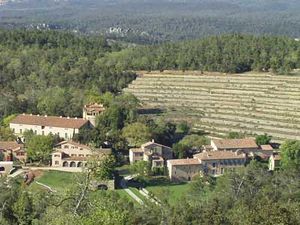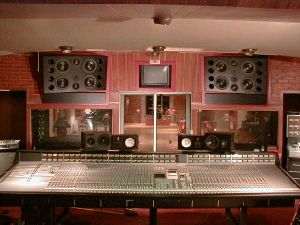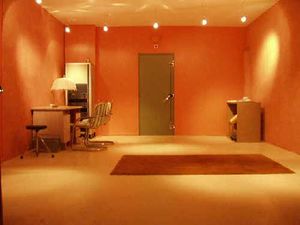Studio Miraval
Redirect to:
Miraval Studios is a residential recording studio in Correns in southern France, part of an 900-hectare estate, situated in Correns, in the heart of the department of Var, Provence, near the French Riviera.
History & Information
Founded in 1977 by French pianist Jacques Loussier and sound engineer Patrice Quef, the studio is set in the ground of an imposing 17th century Provencal chateau, and surrounded rolling hills, pine woods and lush Provence vineyards. The studio paid host to several well-known music artists throughout its history, including AC/DC, Level 42, Kelly Family, Rammstein, The Cure, Judas Priest and Pink Floyd, who recorded part of The Wall at the studios.
Miraval Studios was originally operational under the name "Studio Miraval" until the mid-2000s, a couple of years after Louisser sold the complex to businessman Tom Bove. Bove sold the estate to Brad Pitt and Angelina Jolie in 2011.
In 2022, Brad Pitt now separated from Angelina Jolie, who sold all her shares in the estate, decided to re-open the studio in collaboration with French producer Damien Quintard. The studio recieved a major upgrade, both visually and technically, with one of the first addition being a Dolby Atmos system.
History with Muse
During the band's time at Miraval, the album was hindered by the band's fear of bats and ghosts, as well as the owner, who purportedly didn't want Muse there. Only two songs were recorded during Muse's time at Miraval, namely Take a Bow and Invincible, although around 20 songs had been written at the time.[1] Whilst three of these songs became B-sides, the others were left unfinished or as demos as the band were focused on finishing the eleven album tracks, and later became involved in live performances and recording new material.[2][3]
Matthew Bellamy claimed that had the entire recording process been carried out at Miraval, it would have turned out akin to Pink Floyd's "Dark Side of the Moon". He described some of the material that they put aside from their time at Miraval as "a little too progressive and symphonic" for the type of album they wanted "Black Holes and Revelations" to be,[4] and "waffling on the piano, a lot of orchestration".[4] The band had become frustrated during their time at Miraval at the "lack of rock" in their music.[4]
Studio
Studio Area
It has an area of 400 m², it's the main room, not much information is given from the website, but it's assumed that this is (Obviously) where the recording takes place.
Control Room
It has an area of 700 m², here the mixing takes place.
SPECS
- Desk: SSL 4064 Full Serie G, 56 Channels & 8 Stereo channels with total recall, Computer G and Printer
- Monitors: Dinaudio M4+ & 3 AMP. Chord, Yamaha NS 10, Auratone.
- Tape Machines: 1 Sony 3348, 48 Tracks digital, 1 Studer A800 MKIII 24 Tracks Analog, 1 MITSUBISHI X86 2 Tracks digital, 1 STUDER A80 Stereo 1/2" Analog, 1 DAT Sony PCM 2500, 1 DAT Sony PCM R 500, 1 DAT Sony 57 ES, 1 CD Recorder MARANTZ CDR 620, 1 K7 PIONNEER CT 656, 1 SYNCHRO BTX (Shadow and shadow pad)
- Stereophones: Beyer DT 100, Sony MDR-V5
Live Room
It has an area of 50 m².
Songs recorded by Muse here
(as noted in the Black Holes & Revelations sleeve notes)
References
- ↑ Discussion in London (2006-05). Rock Mag. Retrieved 2007-05-09. [verify]
- ↑ sam_linnett. (2006-06-01). Muse Interview In French Magazine. Retrieved from muselive.com.
- ↑ News (2008-11-28). Muse website. Retrieved 2008-11-29 from board.muse.mu. [verify]
- ↑ a b c Lindsay McDougall. (2007-08-02). [Interview with Matthew Bellamy]. The Breakfast Show. Retrieved 2007-08-02 from abc.net.au. [verify]



